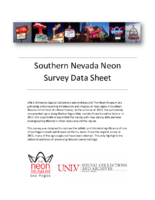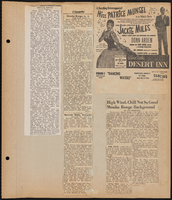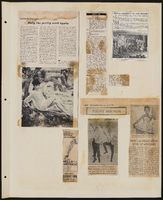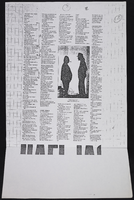Search the Special Collections and Archives Portal
Search Results
Joseph "Wingy" Manone Papers
Identifier
Abstract
The Joseph "Wingy" Manone Papers (1934-1996) include a partial draft of his autobiography, newspaper clippings, correspondence, magazine articles, and press releases related to his musical career. Manone also wrote music, some of which is included in the collection.
Archival Collection
Kane Springs Ranch Records
Identifier
Abstract
The Kane Springs Ranch Records (1930-2005) contain materials related to the Kane Springs Ranch in Meadow Valley Wash outside of Moapa, Nevada. The collection primarily focuses on the property itself, but also contains a genealogy of the Huntsman family, the ranch's first owners. Records include deeds and materials from the sale of the Kane Springs Ranch to the Bureau of Land Management in 2005. The bulk of the collection documents how the Bradley Stuart family used its resources from 1952 to 2003. These materials are related to water usage on the property and a rock and sand mining operation.
Archival Collection
Danny Cassella Collection of Sheet Music
Identifier
Abstract
The Danny Cassella Collection of Sheet Music (1940s-1960s) consists of stock arrangements for songs and scores from the 1940s through the 1960s. The arrangements were collected by musician Danny Cassella. Additionally the collection contains several Tune-Dex cards.
Archival Collection
Tonopah and Tidewater Railroad Records
Identifier
Abstract
The Tonopah and Tidewater Railroad Records (1905-1977) contain correspondence, purchase requisitions, bills of lading, freight reports, and waybills. Also included are a ledger book, a rubber stamp, and a booklet, "Diagrams of Locomotives and Tenders." Incorporated in 1904, the Tonopah and Tidewater Railroad operated for 35 years, connecting Ludlow, California with Beatty, Nevada by way of Death Valley on the Santa Fe Railroad main line. The records are concentrated on the later years of the railroad from 1930 to 1940.
Archival Collection
Frank Williams Papers on Early Nevada
Identifier
Abstract
The Frank Williams Papers on Early Nevada (1892-1946) consists of manuscripts written for the most part by Frank Williams, an early resident of Southern Nevada. The collection includes Williams' autobiography as well as histories of Goodsprings, Potosi Mine, Mesquite Valley, and the Yellow Pine Mining districts. Finally, this collection contains reports and material reflecting Frank Williams' two terms as University Regent (1909-1912 and 1923-1942) at the University of Nevada, Reno, and his four terms in the Nevada State Assembly.
Archival Collection
Central Credit, Inc. Records
Identifier
Abstract
The Central Credit, Inc. Records (1956-1987) contain meeting minutes, employee records, business ledgers, newspaper clippings, membership applications, photographs, and reports. Also included are incorporation papers, a Code of Ethics, Credit Law, Tod Early's personal calendars/diaries, and audiovisual materials. Central Credit, Inc. had branches in Reno, Las Vegas, and Lake Tahoe, Nevada, and also in London.
Archival Collection

Inspire Theater Neon Survey document, August 18, 2017
Date
Archival Collection
Description
Site address: 107 S Las Vegas Blvd
Sign owner: Fremont LV Blvd LLC
Sign details: The original construction year of the building dates back to 1952. Though in 2013 the building was redesigned to open as the Inspire theater in 2014. The Inspire Theater offers a variety of venues including a 150 seated theater, a rooftop patio and multiple cocktail bars.
Sign condition: 5 - new sign with good quality day and night
Sign form: Blade and semi-decorated shed
Sign-specific description: The sign itself is all connected though it wraps around the whole building, it starts with a long rectangular blade with their logo then goes in a rectangle around the building and ends with their logo on a shorter blade with their logo. The longer white rectangular blade portion begins on the corner of the building above their rooftop lounge (which meets together back to back with a smaller rectangular blade). If you are going north on Las Vegas Blvd you will see the big blade which reads "INSPIRE" in channeled silver thin print font letters. The adjacent blade is a bit shorter, so you can see a portion of the big blade over the smaller one if you are looking at the building from the East Fremont District, with this overlay it looks like there is a letter "I" and a dash(-) underneath it. On the actual portion of the shorter blade there are the "INSPIRE" thin channeled font letters, which are identical in design to the other side of the sign but just a smaller font. The outside edges of these back-back signs are horizontally lined with neon tubing. These blades then continue around the building into two horizontally neon lined strips that make the building have a decorated shed feature to it. This then makes a rectangular feature around the whole building. In between the top of the rectangle and the bottom, there is a balcony where guests can hang out. Though on both the left and the right sides of the blade there are plasma screens that show advertisements for their property. Also on the west side of the building there are thin horizontal strips of LED/plasma lights that sparkle in an iridescent fashion.
Sign - type of display: Neon
Sign - media: Steel
Sign - non-neon treatments: T.V. screens, LED
Sign animation: Flasher and iridescent light flow
Sign environment: On the corner of South Las Vegas Blvd. and Fremont St. East, the first property on the south side of the Fremont St East District.
Sign - date of installation: 2014
Sign - thematic influences: The sign is incorporated into the architecture, as well as the sign wraps around the entire building which is remnant of the decorated shed look. The sign is related to the theater theme since the blade style sign was very prominent for the 1950's and 60's movie theater signs, such as the El Portal movie theater sign.
Sign - artistic significance: Their sign is very remnant of a 1950's Movie theater sign with the blade and wrap around of Neon, since they are a modern day theater it seems as if it's a retro throwback.
Survey - research locations: Inspire website, assessor's website
Surveyor: Emily Fellmer
Survey - date completed: 2017-08-18
Sign keywords: Blade; Neon; Steel; LED; Flashing; Video screen
Text



